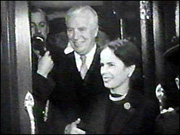 |
| Charlie Chaplin and his wife Oona arrived at Waterloo to a rapturous reception |
|
1952: Charlie Chaplin comes home
|
Artificially 1969: FilmTheTheAA World famous film actor and director Charlie Chaplin has returned to England for the first time in 21 years.
He arrived with his wife Oona - daughter of playwright Eugene O'Neal - and their four children at Southampton on the Queen Elizabeth cruise liner.
He was greeted by hundreds of well-wishers and told waiting journalists he and his family planned to travel around the country.
"We're here for the opening of the benefit for the Royal Society for Teaching the Blind and then after that we have an idea of touring beautiful England and going to all the historical spots."
He added: "This is the first time that my wife has been abroad and naturally we're going to try and cram in as much as we can."
But he would not comment on reports that the US Attorney General James McGranery may not allow him to return to America pending an investigation into alleged "subsversive", left-wing activities.
The Chaplin family then took a train to London's Waterloo station where he was again greeted by cheering crowds.
Mr Chaplin later gave a press conference outside the Savoy Hotel where he told reporters it was a "shock" to see Waterloo Bridge - which has been rebuilt since he was last in the capital - but that Big Ben was "a beautiful sight".
He has come over from America to promote his latest film, Limelight, a story of life in the music hall set in 1917.
The premier will be shown on 16 October at the Odeon Cinema, Leicester Square.
Mr Chaplin was born in London in 1889, the son of music hall entertainers. His mother had a nervous breakdown and his father died when little Charlie was five.
He danced in the street for pennies with his half-brother, Sydney, and was then sent to an orphanage. He came to America when he was 17 with a troupe of players and in 1912 joined the Keystone company to appear in his first silent film, Making a Living.
In 1919 he co-founded United Artists and made such classics as The Kid (1921), City Lights (1928), Modern Times (1936), and The Great Dictator (1940).
|